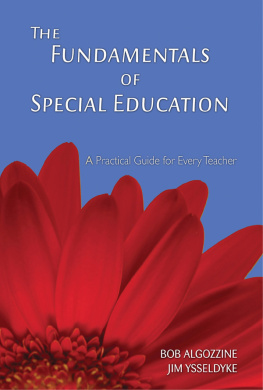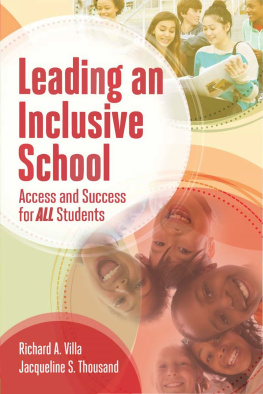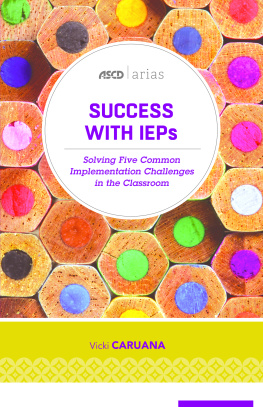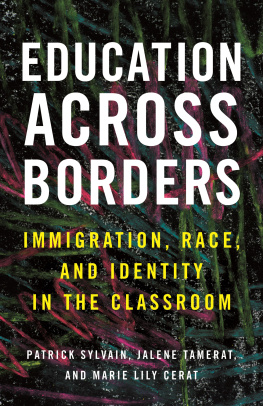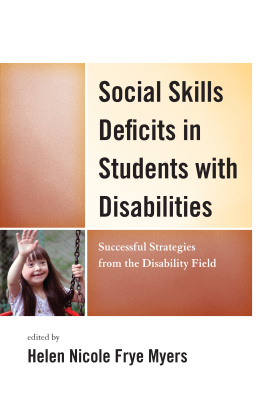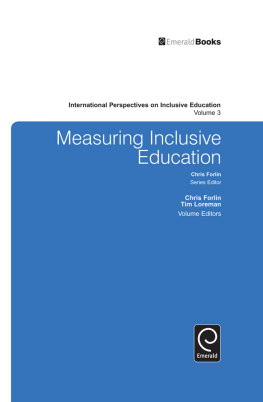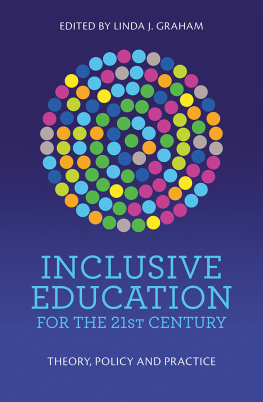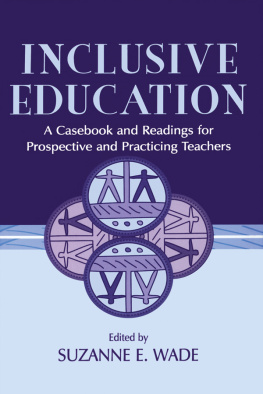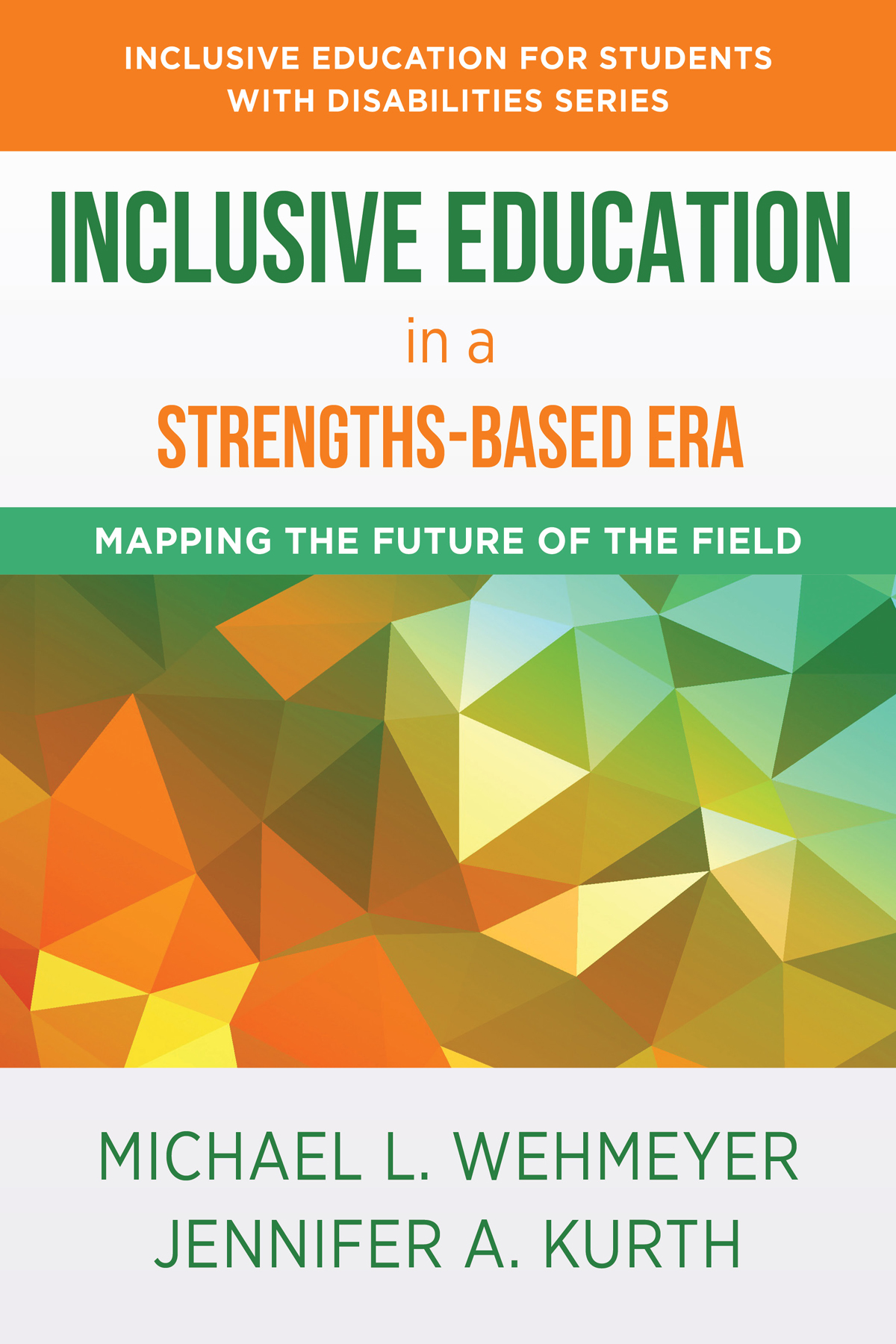Contents
Guide
Page List
The Norton Series on Inclusive Education
for Students with Disabilities
Michael L. Wehmeyer and Jennifer A. Kurth, series editors
The Series on Inclusive Education for Students with Disabilities is a publishing home for books that offer strengths-based approaches to understanding disability and that propose educational supports to enable all students, with and without disabilities, to succeed. Books in the series provide practical, research-referenced information for educators who teach students with disabilities in typical education contexts with their non-disabled peers.
Inclusive Education in a Strengths-Based Era
Michael L. Wehmeyer and Jennifer A. Kurth
Norton Books in Education
INCLUSIVE EDUCATION
in a
STRENGTHS-BASED
ERA
Mapping the Future of the Field

MICHAEL L. WEHMEYER
JENNIFER A. KURTH

This e-book contains some places that ask the reader to fill in questions or comments. Please keep pen and paper handy as you read this e-book so that you can complete the exercises within.
This book is dedicated to the many teachers and administrators whose efforts demonstrate the effectiveness and importance of inclusive and personalized education.
Contents
E ducational practices exist within contexts, whether that context is set by federal legislation like the Every Student Succeeds Act or the Individuals With Disabilities Education Act, or involve social and civil contexts such as what we (in the U.S.) experienced in 2020 due to the COVID pandemic and the movement toward social justice, or as a result of economic or environmental circumstances such as those created by the global economy. In Endrew F. v. Douglas County School District (2018), the U.S. Supreme Court held that an appropriate public education, as guaranteed by federal law, is one in which each student has an appropriately ambitious educational program that gives them the chance to meet challenging objectives, and that the students educational program must be determined only after careful consideration of the childs individual potential for growth. We believe that this ruling creates a new and powerful context in which to make greater strides in ensuring that every student receives a high quality education.
The Endrew decision is not the only contextual factor that is dramatically changing the landscape for the education of all learners, including students with disabilities. Before the worldwide global pandemic, there was already a movement toward more personalized learning. For good or ill, the pandemic seems to have accelerated the role of technology in education and, we believe, will ultimately result in schools adoption of personalized, self-determined learning. We say that with some certainty because, as we discuss in this book, the world today is very different from the world 100 and 50 years ago, when the current education system and special education system (respectively) were established. We believe that these global changes and the drive toward personalized education and self-determined learning provide opportunities to create a fourth generation of inclusive practices that are predicated on what Endrew declared: all children deserve the opportunity to have a challenging education based upon student strengths and potential for growth. There is a unique opportunity to jettison separate, siloed systems that have been intractable with regard to achieving the vision of full inclusion. Further, the contexts in which disability itself is understood are changing dramatically. We are, for the first time in history, poised to approach the design of educational supports within a strengths-based paradigm. Strengths-based approaches are based on social models of disability: on the assumption that understandings of disability are rooted in the attitudes, structures, and environments in society and the restrictions inherent in these contexts. Within such models and approaches, disability is viewed as a part of, and not apart from, typical human experiences. Adopting the supports paradigm driven by strengths-based approaches to disability empowers educators to abandon long-held presumptions about limitations and deficits and to design supports that enable all learners to succeed.
The role of educators will, inevitably, change in a context in which education adopts strengths-based approaches that are personalized, emphasize self-determined learning, and provide supports that enable student success in typical contexts with their non-disabled peers. But, we believe that these changes provide opportunities for special educators to impact positive outcomes for more students, to provide expertise and experience that contributes to the success of the whole school, and ultimately enables them to achieve the goals that drove them to become an educator in the first place.
Books in our series provide theory-to-practice bridges for inclusive practices; that is, they provide practitioner-friendly, research-referenced information for educators who teach students with disabilities in typical education contexts with their non-disabled peers. The focus of volumes in the series is on emerging and innovative educational practice directions that have direct implications for building systems of support that enhance the inclusion of students with disabilities in schools. In development are books on implementing a supports paradigm in education, differentiating instruction, providing schoolwide supports, and team teaching and collaboration. Under discussion are books on self-determined learning, teaching core content subjects in inclusive settings, assessment to promote inclusive education, and the role of technology and universal design in promoting inclusive practices. The purpose of this volume is to lay the foundation for future volumes that provide that information. Our intent is to describe in full the contexts that are impacting the education of all learners, to identify the intent of federal legislation like IDEA and court rulings like Endrew, and to provide a broad overview of how we, as educators, move forward to support and enable all students to become self-determined learners and to succeed in the changing context of education in a post-COVID world.
About the Authors
Michael Wehmeyer has been engaged in educating learners with exceptional support needs for more than forty years, serving as a special education teacher, an advocate, a researcher, and a teacher-trainer. His work is focused on promoting self-determination and inclusive practices and believes that the ideas in this book provide a road map to a future in which all students receive an education that enables them to live full, rich lives in their communities.
Jennifer Kurth has been a teacher and teacher educator for over twenty years. She also researches methods of implementing high-quality inclusive education, and is optimistic about a future in which all students are highly valued members of their schools and communities.
INCLUSIVE EDUCATION
in a
STRENGTHS-BASED
ERA
O ne refrain heard frequently in discussions of 21st-century learning is that the current education system was built for a bygone era; that it was built for an economy and a society that no longer exists (National Education Association, 2016, p. 5). In the current global economic context, students can no longer be successful focusing only on core academic skills, they must learn how to communicate, to be creative, to engage in critical thinking, to solve problems, and to self-determine learning.
Next page

